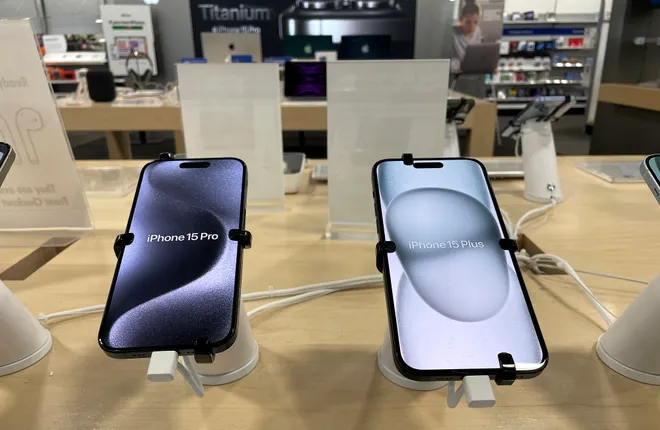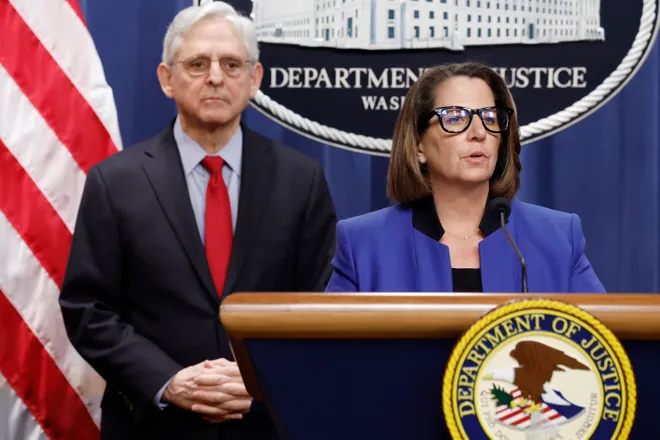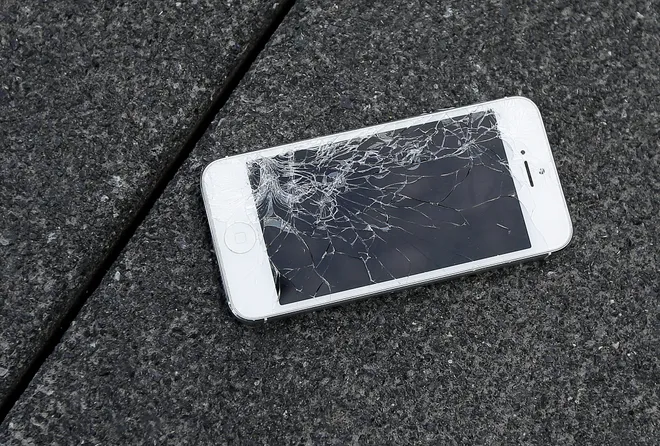Justice Department sues Apple for allegedly monopolizing the smartphone market
WASHINGTON – The Justice Department sued Apple Inc. on Thursday for allegedly monopolizing the smartphone market.
Apple allegedly restricted developers of apps, products and services used on the iPhone that could otherwise lower costs for consumers, according to the lawsuit filed in New Jersey. The alleged monopoly allows Apple to extract more money from consumers, software developers, publishers and merchants, according to the lawsuit joined by 16 state and district attorneys general.
“We allege that Apple has consolidated its monopoly power not by making its own products better − but by making other products worse,” said Attorney General Merrick Garland, who said Apple commands 65% of the U.S. smartphone market with products that cost up to nearly $1,600. “Consumers should not have to pay higher prices because companies violate the antitrust laws."
Apple issued a statement saying the lawsuit threatens the company's ability to provide innovative technology and could set a "dangerous precedent."
"This lawsuit threatens who we are and the principles that set Apple products apart in fiercely competitive markets," the statement said. "If successful, it would hinder our ability to create the kind of technology people expect from Apple − where hardware, software, and services intersect. It would also set a dangerous precedent, empowering government to take a heavy hand in designing people’s technology. We believe this lawsuit is wrong on the facts and the law, and we will vigorously defend against it.”
Prep for the polls: See who is running for president and compare where they stand on key issues in our Voter Guide

Apple lawsuit part of legacy of Standard Oil, AT&T and Microsoft: Kanter
Federal officials said the lawsuit follows in the legacy of challenges to the monopolies of Standard Oil, AT&T and Microsoft.
“The remedy paved the way for Apple to launch iTunes, the iPod and eventually the iPhone free from anticompetitive restrictions, excessive fees and retaliation,” said Jonathan Kanter, assistant attorney general for the antitrust division.
“We have focused on a pattern of conduct that goes back over a decade that Apple has engaged in, in order to reinforce its monopoly power by excluding rivals, by excluding technologies and by stifling innovations that would threaten Apple’s stranglehold on its monopoly power," Kanter added.
Both Apple and Google have been scrutinized by developers over the commissions it charges on in-app purchases. In 2020, Epic Games sued Apple claiming the tech giant has "unreasonable restraints" over how it handles in-app payments.
A federal judge ruled in 2021 that Apple had to let developers use payment options outside of Apple’s app store, which circumvented Apple’s 30% commission on app transactions. Apple had pulled the game Fortnite from its app store in a dispute over its distribution. The Supreme Court eventually refused to hear appeals from both sides, but the case was widely considered a victory for Apple.
Asked why he thought the Justice Department would fare better, Garland said, "The United States normally wins the cases that it brings."
Also in 2021, European Union regulators accused Apple of violating antitrust laws, alleging that the company distorts competition for music streaming through rules for its App Store. The union’s executive commission objected to Apple rules in its App Store about music streaming services competing with its own Apple Music service, saying that it ends up costing consumers more and limiting their choice.

Apple 'smothered' smartphone industry: Monaco
Deputy Attorney General Lisa Monaco said Apple had gone from revolutionizing the smartphone market to stalling its advancement.
“It has done so not through product improvements − but by maintaining a chokehold on competition – locking its customers into the iPhone while locking its competitors out of the market,” Monaco said. “This shift has smothered an entire industry − from users to app developers to the next generation of innovators.”
The problems with iPhone limiting options on its products are apparent through messaging with users of other phones, Garland said. Texts are not encrypted, videos are grainy and users can’t edit messages that appear as a green bubble, Garland said.
“As a result, iPhone users perceive rival smartphones as being lower quality because the experience of messaging friends and family who do not own iPhones is worse − even though Apple is the one responsible for breaking cross-platform messaging,” Garland said.
Apple also allegedly blocked third-party developers from creating digital wallets to compete with the iPhone with what is called a tap-to-pay function, Garland said.
“That is the function that makes a digital wallet – well, a wallet,” Garland said. “Instead, Apple forces those who want to use the wallet function to share personal information with Apple – even if they would prefer to share that information solely with their bank, medical provider, or other trusted third party.”
New Jersey Attorney General Matthew Platkin said the price of an iPhone adjusted for inflation since 2007 should be $450 today rather than nearly $1,600. Customers also voice their frustrations to him about apps that are unavailable or that don’t work with other phones.
“I was talking to somebody the other day: ‘Can you believe a phone costs $1,600 – it’s like buying a computer.’” Platkin told USA TODAY. “Every time they can’t get apps that their friends or family can get on other platforms, or that they use overseas, simply because Apple decided it’s not in Apple’s best interest for that type of innovation – that’s textbook monopolistic behavior. That’s textbook violations of our antitrust laws.”

Justice officials wield Apple executive comments against them
Justice Department officials quoted Apple executives speaking against competition with other smartphones as part of the justification for the lawsuit.
Apple CEO Tim Cook was asked in 2022 whether Apple would fix iPhone-to-Android messaging, so somebody could send their mother videos more easily. Garland said Cook’s reply demonstrated the problem with Apple’s monopoly power.
“Buy your mom an iPhone,” Cook said.
In 2010, a senior Apple executive emailed the then-CEO of Apple about an ad for the new Kindle e-reader. The ad began with a woman using her iPhone to buy and read books on the Kindle app. She then switches to using an Android smartphone and continues to read her books using the same app.
The senior Apple executive expressed his concerns in candid terms: “Not fun to watch.”
“Apple was clear in its response: it would “force” developers into using its payment system,” Kanter said.
Apple kept prices and fees high by hindering app development: DOJ lawsuit
The lawsuit alleges Apple kept prices and fees higher by:
◾ Blocking innovative super apps. Apple has disrupted the growth of apps with broad functionality that would make it easier for consumers to switch between competing smartphones.
◾ Suppressing mobile cloud streaming services. Apple has blocked the development of cloud-streaming apps and services that would allow consumers to enjoy high-quality video games and other cloud-based applications without having to pay for expensive smartphone hardware.
◾ Excluding cross-platform messaging apps. Apple has made the quality of cross-platform messaging worse, less innovative, and less secure for users so that its customers have to keep buying iPhones.
◾ Diminishing the functionality of non-Apple smartwatches. Apple has limited the functionality of third-party smartwatches so that users who purchase the Apple Watch face substantial out-of-pocket costs if they do not keep buying iPhones.
◾ Limiting third-party digital wallets. Apple has prevented third-party apps from offering tap-to-pay functionality, inhibiting the creation of cross-platform third-party digital wallets.

Apple replied to complaints with 'Whac-A-Mole' rules: Kanter
Kanter said Apple changed contract rules and restrictions to keep prices and fees higher.
“For years, Apple responded to competitive threats by imposing a series of ‘Whac-A-Mole’ contractual rules and restrictions that have allowed Apple to extract higher prices from consumers, impose higher fees on developers and creators, and to throttle competitive alternatives from rival technologies,” Kanter said.
Apple is headquartered in Cupertino, California, and generated net revenues last year of $383 billion and net income of $97 billion, making it the most profitable company in the Fortune 500 and larger than the economies of more than 100 countries, according to the Justice Department.
Disclaimer: The copyright of this article belongs to the original author. Reposting this article is solely for the purpose of information dissemination and does not constitute any investment advice. If there is any infringement, please contact us immediately. We will make corrections or deletions as necessary. Thank you.







